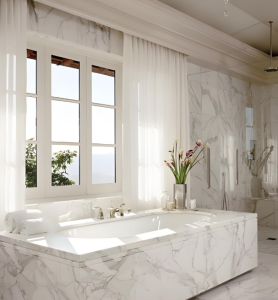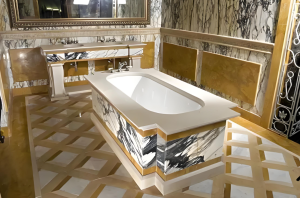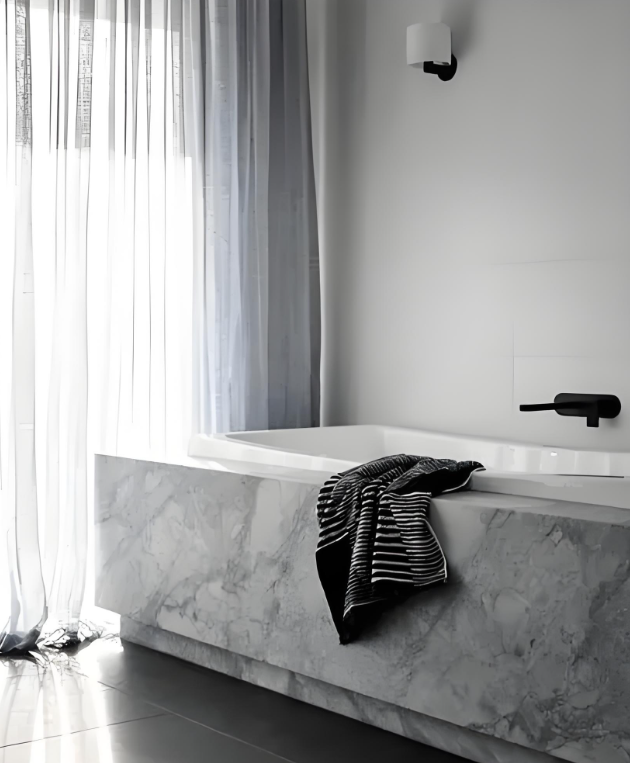Some of the questions we often ask when shopping for a natural stone bathtub include the material of the bathtub, such as aesthetics, durability, and maintenance requirements of different types of natural stone such as marble, granite, or limestone. Particularly for homeowners on upper floor, weight and the installation process are very crucial. We also want daily upkeep, avoidance of stains or scratches on the stone surface, and preservation of its long-term gloss. Since natural stone bathtubs differ widely, cost and economy are also major factors.
Understanding the cost of several stones, methods of processing, and if shipping and installation expenses are covered will enable consumers to better allocate their money. These questions are meant to give us pertinent knowledge to enable us to identify the natural stone bathtub most fit for our requirements. From clients interested in a natural stone bathtub, we have gathered the most often asked questions. You could find these helpful as well.

Natural marble bathtub in luxury bathroom
1. Are natural stone bathtubs good?
Stone bathtubs have long been associated with luxury. They offer a unique visual beauty, and bathing in such a bathtub becomes a special relaxing experience for the body. The body responds positively to the naturalness of the stone. Bathtubs made of various mixtures, resins, concrete, terrazzo or artificial materials do not belong to natural stone bathtubs and should not be labeled as such.
2. What are the benefits of a stone bath?
Some people believe that bathing in a natural stone bathtub is beneficial for high blood pressure, joint pain and skin allergies. However, it is certain that natural stone has a highly relaxing and soothing effect on both the body and mind, without harmful side effects. That is why it is widely used in every SPA.
3. Are stone bathtubs better than acrylic bathtubs?
Definitely. The main difference is: the stone used in the bathtub is harder, more pleasant to the touch and is a 100% natural product. Additionally, natural stone absorbs and retains heat from water several times better than acrylic tubs, which acrylic tubs do not. This means you can spend more time in the tub without having to add warm water. Stone tubs offer greater relaxation and comfort than acrylic tubs.
4. What are the pros and cons of natural stone tubs?
Natural Stone Tub vs. Stone Resin Tub: Pros and Cons
Pros: Easier to maintain than acrylic or stone resin tubs. Retains water heat longer than any other type of tub. Has the longest lifespan. Offers greater relaxation. Each stone is unique, so is each tub.
Cons: Heavy. Before installation, make sure your floor can support the weight and size of the tub. More expensive than acrylic or synthetic tubs.

Create the perfect bathroom
5. What are stone tubs made of?
We use natural stone tubs such as travertine, agate, marble, etc.
Our tubs are carved from a single piece of stone without the use of any gluing, caulking, or joining of multiple pieces. We make our tubs from a single piece of natural rock. Any other bathtub made of composite mixed materials like resins, adhesives, mortar, concrete, or acrylic does not count as a stone bathtub.
6. Is a stone bathtub a good investment for my home’s value?
So far, everyone who has purchased a natural stone bathtub has said yes. Stone bathtubs are very durable and unique, and like any stone, they are able to withstand changing design trends. In a bathroom, many things may change countless times, but stone bathtubs and sinks will remain the same for many years. It is a good investment. All historical buildings prove that despite the passage of years, stone lasts forever.
7. What is the difference between a stone bathtub and other materials in terms of durability?
Of course, it is 100% natural composition. For example, some acrylic bathtubs may yellow over time, while stone remains the same.
Scratch-resistant (except for marble bathtubs), river rock bathtubs are very hard and can withstand many external factors.
8. How does the cost of a stone bathtub compare to other materials?
Comparing the cost of a natural stone bathtub to that of an acrylic bathtub can be challenging. Natural stone bathtubs tend to be more expensive, and the final price depends on the size and type of stone used. However, it all depends on how you look at it. When you consider that acrylic tubs have a shorter lifespan and may need to be replaced after many years, whereas stone tubs remain permanent fixtures, the investment becomes more apparent. Plus, there are the added benefits of relaxation and overall wellness.

Luxury marble bathtub in bathroom
To determine the cost of a stone tub, you will need a custom natural stone tub. Contact us at Caron Stone and we can give you more details. We will need information on the type of stone, size, and time frame you would like to own the tub. All of these factors will affect the price.





